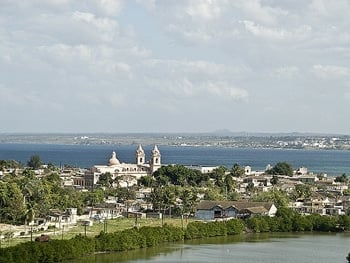On his annual trip to the Iglesia Episcopal de Cuba, Feb. 1 to 13, the Primate, Archbishop Fred Hiltz, brings several new and tangible examples of Canadian Anglicans’ commitment to their Cuban partners.

The Anglican Church of Canada and the Iglesia Episcopal de Cuba have had a special relationship since the 1960s, when politics drove the Cuban and U.S. episcopal churches apart. The Cuban church is not a member of an Anglican Communion province, so the Canadian church assists with governance through the Metropolitan Council of Cuba (MCC), chaired by the Canadian Primate.
The partnership has also flourished in other ways, including through financial support and visits.
Several new partnership features will be unveiled at the church’s annual synod in Havana, Feb. 2 to 4. Accompanying the Primate are Archdeacon Dr. Michael Pollesel, former General Secretary; Dr. Andrea Mann, global relations coordinator; and the new General Secretary of General Synod, Archdeacon Dr. Michael Thompson.
Mr. Thompson, who has visited Cuba several times, will preach his first sermon in Spanish. The 55-year-old has been taking Monday night Spanish lessons near General Synod offices in Toronto. He plans to keep it up long-term and at this stage is enjoying small victories like managing email correspondence.
“I think our church is going to have a long relationship with Cuba,” said Mr. Thompson. “It’s a focal point for our partnerships within the Anglican Communion and I think [learning Spanish] is a respectful thing to do.”
Mr. Thompson, a priest in the Diocese of Niagara, is also pleased to announce at the synod a revitalized partnership between his diocese and Cuba. His former parish, St. Jude’s, Oakville, Ont., has a relationship with Itabo, a church and community garden project formerly led by the current Cuban bishop, the Right Rev. Griselda Delgado del Carpio.
In September, a group from Niagara will visit Cuba and begin redefining the partnership, which began more than 15 years ago.
“I am excited about this in that it is an intentional move by a diocese in refreshing existing companionship that didn’t ever officially close and end, but moved from a vital period into a quiet period,” said Ms. Mann.
“Good reflection, intentional reflection was taken on where should this companionship go and we decided we are going to revitalize the relationship.”
Also at synod, the Canadian delegation will announce two gifts given through the Canadian church’s Gifts for Mission Gift Guide. Cuba-related items proved popular this year; Canadian Anglicans gave close to $1,200 for a diocesan music camp and more than $3,000 to buy two motorcycles for Cuban priests.
Finally, in their 2012 visit, Canadians offer a gift of time. After the synod the delegation will fly to Santiago de Cuba and visit parishes in the southeast corner of the country.
“For me, the value of parish visits is that it helps build a sense of genuine relationship,” said the Primate in an interview before he left. “We spend some time seeing how people live and move. You feel connected.”
Archbishop Michael Peers, Primate from 1986 to 2004, travelled extensively to parishes throughout the Iglesia Episcopal de Cuba. Many in the Cuban church still remember his time with them.
Archbishop Hiltz, now on his fourth visit to Cuba, said he especially values the “little things” from his 2011 tour of Cuban parishes near Havana.
In Coliseo, he saw large church bells lying dormant in the backyard of a lay reader, Roberto. Roberto told the Primate that his dream was to repair his church so the bells could ring again.
The next week, the Primate was able to share Roberto’s story at a re-dedication service for a new carillon in Stratford, Ont. He wants to inspire deeper connections like this between Canadian and Cuban ministry.
Canadian Anglicans provide ongoing governance support through the MCC, which meets yearly. Archbishop Hiltz is chair, Mr. Pollesel is secretary, and other members are leaders of the U.S. Episcopal Church and the Church of the West Indies.
The Canadian church also provides support through these yearly visits as well as regular conversations with Bishop Delgado.
The benefits of the partnership are deep on both sides.
“Everybody who’s experienced the Cuban church reports a kind of incredible generosity and openness,” said Mr. Thompson.
o Read about Canadian student’s recent visit to Cuba.
o View photos from the 2011 visit.
Interested in keeping up-to-date on news, opinion, events and resources from the Anglican Church of Canada? Sign up for our email alerts .
